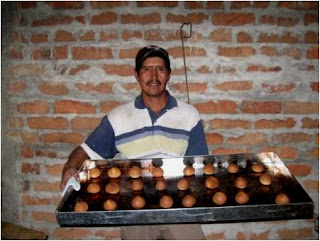Baking Bread -- and Earning it Too!
Through support from Citi Foundation, ProLiteracy and partner organization Fundación Juan Tama have found a way to help make baked goods more readily available, increasing literacy skills along the way.
Called Rincón del Sabor (Taste Corner), this bakery cooperative gives each member a 1 percent return on earnings in exchange for a one-time $100,000COL (roughly $50 US) investment. The members then act as door-to-door salespeople, taking baskets of bread to sell in rural communities.
Members also participate in cleaning the bakery and can earn the privilege of using the bakery’s refrigerator to store their own perishable food items—a considerable opportunity in a place where the cost of a refrigerator can often be more than the average annual salary.
“The bakery cooperative cuts out costs of distribution and transportation and provides rural community members daily with fresh bread,” says Alesha Anderson, international programs coordinator at ProLiteracy, who visited Pitayó in January 2011. “The 12 co-op members have just started breaking even. Part of the
membership includes literacy classes in their native language, Nasa Yuwe, so the members become better equipped to understand their accounts. None of the members has an educational level above fourth grade.”
The relative success of the co-op has inspired members to think entrepreneurially. They are considering an expansion of the bakery into a café with a few tables and chairs. They’re also starting to learn how to make pastries and cakes.
“Rincón del Sabor provides income for people in the community,” says Anderson. “It also emphasizes teamwork. Members quickly see how important working together is for the success of the business as well as for their community.


This is an excellent win-win situation. You have definitely thought "out of the box" on this one. Great work reaching those who need it most.
ReplyDeleteThis is a great way to learn, earn, and make a living. What is more, individuals are gaining invaluable skills that will assist them beyond the context of their environment. Helping others is at the core of who I am, and I would like to use the doctorate I am on track to earn to make a meaningful difference out in the field. This is an example of making a difference that I would like to participate in.
ReplyDelete@Peidei Thank you!
ReplyDelete@ronnie Thanks for your comment, and good luck with your doctorate!
There are many things we do here in the United States that is a similar type situation. A coop/internship learning environment which does turn out to be a win-win situation for everyone involved. I think this is excellent and a much needed adventure in this country. Skills they learn here will only help them further in their life skills elsewhere.
ReplyDeleteKathy
I am very curious-- why are we not using this type of learning/teaching process in US public education, K-12?
ReplyDelete@kristucker Good question! How could we share this message more effectively with policy makers and public school personnel in the United States?
ReplyDelete